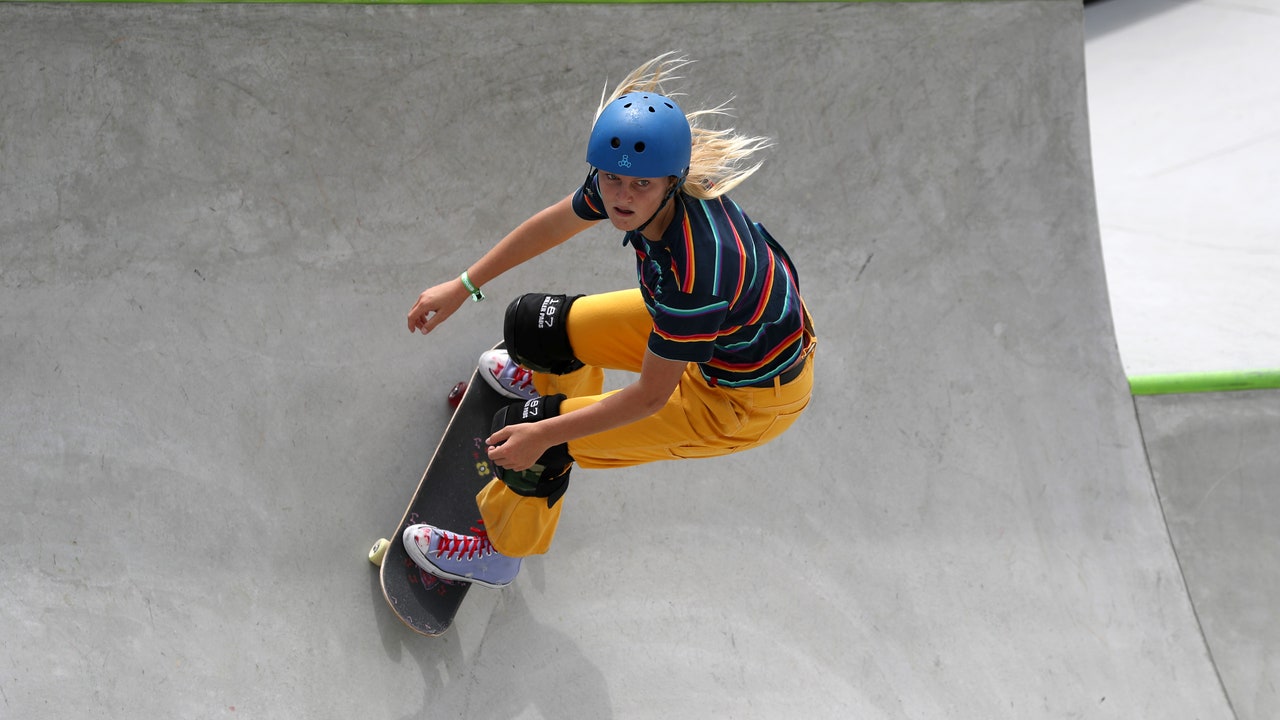Skateboarder Bryce Wettstein Isn’t in It for the Gold

[ad_1]
It has just dawned on Bryce Wettstein, the 16-year-old skateboarding phenom from Encinitas, California, that she could win the first Olympic gold medal in women’s park skateboarding ever. “When you just said that, I feel like I’m tingling. I’m like, Woah! I didn’t even think about it like that,” Wettstein says. “That is just so indescribable, it’s almost like you’d need Leonardo da Vinci next to you to paint it.”
Winning isn’t why Wettstein, who has been competing since she was seven, skates. For her, skateboarding is more of a philosophy.
“It’s sort of like skateboarding takes you on a roller coaster of who you are. That’s what makes it liberating—you find all of these downfalls and pitfalls and uplifting things that you would never find. It’s an introspective thing,” she says. “I’ve never found anything like that before. When I’m skating, I feel like I’m sort of in another cosmos—more like my own universe.”
It is clear within the first 30 seconds of a conversation with Wettstein that she has a kaleidoscopic view of the world. She’s a whole vibe—a seeker, an explorer, a multihyphenate who trains by surfing and playing volleyball and making sure to “never just do one thing all the time.” She is in so many ways the antithesis of the stereotype of the rigid, self-punishing athlete we’ve come to associate with Olympic glory—those who push themselves so hard they vomit, or compete through injuries, or sacrifice their mental health as a matter of routine.
In that way, Wettenstein is part of a cohort of women embodying a different type of Olympian at the Tokyo Games. Like fencer Lee Kiefer, who, while in med school, became the first Asian American woman to win gold in the sport. And Simone Biles, who had the bravery and the foresight to step away from competition at the biggest moment of her career to prioritize her well-being (and then make a bronze medal-winning comeback). And swimmer Lilly King, who called bullshit on those who act like silver and bronze medals shouldn’t be celebrated. These women are challenging the cultural bedrock of competitive sports which for centuries has told athletes, and the rest of us watching them, that winning—gold only—is everything.
As she prepares to compete in the women’s park competition on August 4, Wettstein isn’t thinking about the medals. Instead she’s bringing the same wide-eyed wonder to the competition as the little girls she coaches in her free time. “I feel like they’re always teaching me things that I never knew about the world. It’s hard to see the world in the same way all the time, but when you have the mindset that they do [when you’re skating], you can see things in a million new ways,” she says.
She might be on to something. When skateboarding debuted with its first Olympic event in July, it was three teen girls who took the podium—Japan’s 13-year-old Momiji Nishiya, who won the first-ever Olympic gold in the women’s street skating competition, 13-year-old Rayssa Leal who won silver, and 16-year-old Funa Nakayama, who took bronze.
Medal or not, Wettstein is excited to share the philosophy of skateboarding from the Olympic stage. “Skateboarding is always changing, always malleable, always ready for something else,” she says. “It is constantly, constantly in the process of changing—that’s what makes it so majestical.”
[ad_2]
Source link




